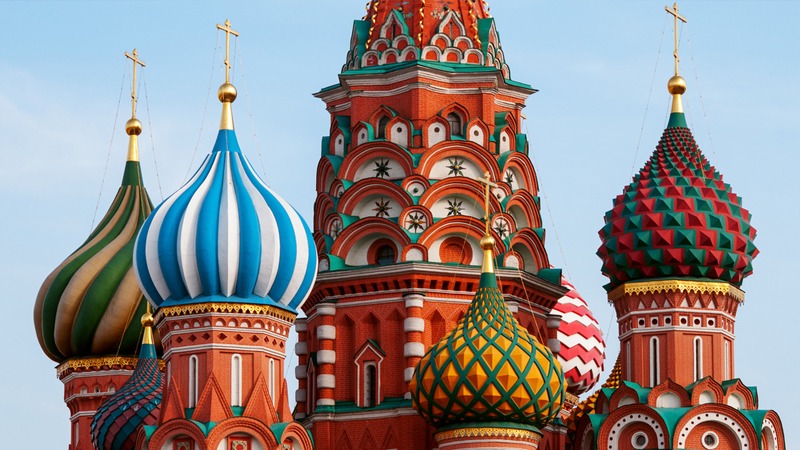of the 195 countries that make up the world today none is as big as Russia spanning over 5,600 mi from the small Enclave of kenrad to the west to Big diamed Island in the East Russia encompasses 11 time zones and a total of 6,612 74 square miles it is in fact so large that the second biggest Nation on Earth Canada could fit within its borders over 1.7 times for well over 300 years Russia in one form or another has maintained its position as the world’s largest country and during the height of its territorial expanse in the year 1866 stretched all the way from Poland to Alaska however just a few centuries earlier a recognizable Russian state did not even exist amongst the patchwork of Waring principalities and juk that made up the region emerged the first glimpses of a nation that through the Ambitions and Endeavors of kacs and Zars alike would rise to become the largest Nation on Earth this is how Russia became the world’s biggest country for the purpose of understanding the emergence of the Russian state and its expansion it is most important to focus on the geographical region of European Russia that is the smaller section of the country that lies west of the eural mountains much of this area is dominated by the river vulga and its tributaries and is where the country’s major cities like Moscow kazen Samara vulgarr and astrian can be found an established country or nation state would not emerge here fully until medieval times but the vast plains of the pontic Caspian step were home to an array of different Indo-European and Germanic tribes over the centuries these included the cians in ancient Greek times followed by tribes such as the samarians the hanss and the Goths who would go on to threaten and later destroy the Roman Empire in the third and 5th centuries ad this region began to emerge with some territorial cohesion and cultural similarity in the 9th and 10th centuries owing to the expansion of the north out of Scandinavia although the Vikings are more commonly associated with their raids and conquests of Britain and Western Europe they were much more active in Eastern Europe during this time having sailed across the Baltic Sea and down the Great Rivers of the vulga Dawn and NEPA they entered the black and Caspian seas and went on to launch raids against
the Byzantine Empire and Arab caliphates over time these transient normen began to settle more permanently on the banks of the rivers which they traversed laying their foundations of cities like keev Novgorod and sta loga which they governed as small independent city states the Norse rulers of these settlements who were known as the Roose gradually assimilated with the local Slavic population and subsequently expanded their territories to form the first large scale states in the region such as the Civ and ruse state of late 9th century and later the novaro Republic of the 12th century by the 13th century the republics and principalities which had emerged along the banks of the rivers and lakes of Western Russia like Novgorod scov Z and the duy of mosy had grown prosperous with trade and commerce novr in particular benefited from close trade links with the htic league of merchant cities across the Baltic Sea and North Sea by the year 1223 however a threat to this period of relative peace and prosperity had emerged from the East the Mongols these nomadic Horsemen from Asia had swept Westward across the Eurasian step under the leadership of Genghis Khan and his successors conquering every city that crossed their path they successfully engaged a coalition of the Roose principalities at the Battle of the Cala River but then withdrew their forces back East they would return however 14 years later and would subjugate almost all of the Southern lands of the Roose raising cities like ke to the ground in 1240 and incorporating its lands into their own as a vessel of the golden horde the majority of the northern rou principalities escaped such a destruction by submitting to the Mongols whose hold over Western Russia continued for the next two Centuries with several carnat being established along the lower courses of the rivers VGA and Dawn the golden horde the Crimean carnate and the carnate of Kazan exerted great power and influence across the region and extracted heavy tributes from the northern Ru cities and territories such as mosy and novarad that were not formerly under their control the Mongol carnat across Asia were in decline by the start of the 15th centur Century as new powers like the Ottomans in the Middle East and the Ming dynasty in China Rose to prominence in Russia the rising power was that of the duchy of mosy which during the reign of Ivan thei between 1462 and 1505 launched a series of campaigns against the carnate of Kazan to wrestle control of the upper reaches of the river buga Ivan II also conquered Novgorod as well as the Republic of sov and the principality of T absorbed them into his territory thus by the start of the 16th century a centralized Russian state of sorts had emerged which stretched from Lake loga in the North and South along the river vulga these territorial Acquisitions were furthered by his grandson Ivan IV otherwise known to history as Ivan the Terrible who extended Russian rule further south towards the Caspian Sea in the year 1547 Ivan IV had himself crowned foundas the first Zar of all Russia and set in motion a series of events that would initiate Russia’s Eastward expansion over
the Euro mountains in the comingcenturies this undertaking was initially carried out by small bands of cacs from the step a semi-nomadic people who were well regarded for their skills in fighting on Horseback they were thus hired by the Russian authorities to probe further Eastward and under the leadership of figures such as Yak timovi the CAC successfully conquered with the seir carnate in what is now Kazakhstan although their unbridled Ambitions would quickly set off a chain of further exploratory Journeys deeper into the vast region of Siberia within 100 years Russian explorers had reached the Kamchatka Peninsula on the shores of the Pacific Ocean and over the course of the 17th and 18th centuries small colonies began to sprout across the region further efforts were also made to expand Russian territory to the lands that lay across the mighty Pacific Ocean with Vitus bearing a Danish captain and cartographer in the employ of the Russian Navy being commissioned in 1733 to explore the sea and Straits which were consequently named after him in honor of his achievements although the Expedition ultimately cost bearing his life the discovery of the islands and adjacent Coastline of Alaska in 1741 enticed further Explorations by fur Trappers and adventurers to the region resulting in the lands to be formerly claimed by Russia despite the impressive accomplishments of Eastwood expansion during this time the primary objective of Russia in the 17th century was to develop closer ties with Continental Europe through expanding westwards and ultimately secure access to a warm water port in the Baltic Sea at the time Finland and much of the region around what is now the Northwestern extremity of Russia were controlled by the kingdom of Sweden who also controlled parts of the Baltic states Russia was consequently reliant on the port of arhangel in the far north of the country for much of its trade with Europe however its position inside the Arctic Circle limited its viability due to the freezing conditions in Winter as a result of this Russia embarked upon prolonged war against Sweden to acquire new lands in the Baltic Sea region and secure the warm water Port it so desper needed the Great Northern war which was fought from 1700 to 1721 saw Zar Peter the known to posterity as Peter the Great defeats the swedes and in the process claims sovereignty over lands encompassed by the Gulf of Finland as well as modern day Estonia and Latvia With Victory secured Peter the Great subsequently began constructing a great new capital city on the shores of the Baltic Sea one which he modestly named after himself St Petersburg his Reign was also highly significant in other ways for he undertook a substantial tour of Western Europe earlier in his Reign from 1697 to 1698 to learn about the scientific and technological developments taking place there upon his return He emulated what he had witnessed in the west and began modernizing Russia and transforming it into one of the continent’s great Powers by the time is rign ended in 1725 Russia had emerged an international major power after years of being a backward and impoverished Nation the expansionist efforts of Peter were solidified later in the 18th century by Katherine the Great who ruled from 1762 to 1796 who wished to see Russian power exerted to the South around the Black Sea to that end war was declared against the Ottoman Empire in 1768 and by 1774 Russia had seized control of the cities of aov and Kirch from this secured footing Russia continued to incrementally expand its Southern borders at the expense of the Turks in the decades that followed by marching troops into the Caucasus the northeastern parts of the Balkans as well as the Crimean Peninsula other territories were also acquired under the reign of Katherine the Great which were only possible due to the partitions of Poland the Polish Lithuanian Commonwealth had declined dramatically as a power during the 18th century by the 1770s it’s three powerful neighbors Russia Prussia and Austria were in a position to effectively divide the nation up between themselves over the course of three partitions in 1772, 1793 and 1795 Russia acquired extensive territory comprising most of Ukraine virtually all of bellarus and Lithuania as well as a small proportion of Eastern Poland this cemented Russia’s position as one of the most formidable and powerful states on the continent owing chiefly to its sheer size and the innumerable populace that could be called upon to defend it this flexing of military and Imperial might was demonstrated during the Napoleonic Wars when it was Russia alone amongst the Continental Powers which was able to successfully with understand the advance of the French Emperor Napoleon bona-part despite suffering an invasion by France in 1812 Russia was able to successfully repel it principally due to the vastness of its territory and the harshness of its Winters which decimated the ranks of the invading French army by the time the conflict concluded in 1815 Russia had also benefited from acquiring control of parts of what is now Poland as well as Finland which s Alexander Ruled semi-independently of Russia as Grand Duke separate conflicts of the early 19th century were fored against the Turks around the Black Sea as well as the Persians and native tribes of the Caucasus which saw further Russian gains in these regions Russia would come to reach the height of its power during the 19th century this period witnessed a genuine fear amongst Europe’s other great Powers particularly Britain who were concerned that Russia’s continuing expansion would come to threaten their colonial interests on the global stage in the Far East Russia was able to secure territorial concessions from China in 1861 which led to the founding of Vladivostok the country’s only icef free port on the Pacific coast this acquisition became of increasing strategic importance in the years that followed for in 1867 Russia decided to sell its Imperial
land Holdings in North America in the shape of Alaska to the United States for a then relatively modest sum of 7.2 million equivalent to $151 million in today’s money in order to compensate for the relinquishment of Alaska Russia decided to pursue its interests further into Central Asia although this shift strategy inevitably raised concerns amongst the British he viewed this as encroachment upon their territory of the British rage in India and Pakistan the immense diplomatic and Military contest that emerg from this has come to be known at the time as the great game which saw both Britain and Russia VI for control and influence over Afghanistan and Persia the Two buffer States between their respective empires in both instances Russia’s designs were foiled although they did manage to secure control over the carnate of Kea and the Emirates of bukara around what is now Kazakhstan usbekistan Tajikistan turkistan and kistan neither the British or the Russians were ever able to secure direct control over Afghanistan despite repeated military efforts over the decades meanwhile in the Mediterranean the dramatic decline of the Ottoman Empire had seen Russia capitalize on the opportunity to seize yet more more territory during yet another Russo Turkish war between 1877 and 1878 although the Russian Advance would come to a halt by the time they reached the Balkans their proximity to Constantinople and the possibility of seizing the city along with access to the Mediterranean Sea posed a genuine threat Europe’s major Powers subsequently United at the Congress of Berlin in 1878 to Halt any further Russian Ambitions in the Balkans and Ensure that out of the disintegrating Ottoman Empire would emerge new States like Bulgaria Romania and Serbia which were to be free from direct Russian control for all that Russia had acquired in terms of Territory between the 17th and 19th centuries it nevertheless remained a backward country with a poor economy especially when compared to its Western contemporaries the authoritarian political system of zaris Russia had also created a tense political Atmosphere by the second half of the 19th century with increasingly radical movements like anarchism and communism finding growing support amongst the people it was during Russia’s disastrous participation in the first world war that the Communists seized the opportunity to launch a revolution in 1917 by the end of that year under the leadership of Vladimir Lenin the Communists also known as the Bolsheviks or Reds had seized control of St Petersburg and Moscow but a bitter Civil War quickly ensued between them and the less radical elements of Russia’s revolutionaries who were known as the whites the end result when the war came to its conclusion in 1923 was the emergence of the Union of Soviet Socialist republics or USSR in which the Communists had managed to retain control of the vast majority of the Russian Empire although Poland Finland and the Baltic states had used the opportunity to declare independence and once again established their own nation states the very survival of the USSR however would quickly be thrown intoquestion with the onset of the secondworld war in1939 the six-year conflict provedimmensely costly for the Soviets but asthe German forces began to withdrawacross the Eastern front in 1943 the Soviets advanced in their wake across Eastern Europe in the war’s aftermath the USSR was able to Annex practically the entire region with the Baltic states being Amalgamated directly as the Soviet Republic whilst Communist vassel States were established across the likes of Poland East Germany Czechoslovakia and Hungary although the post-war period did not see any further territorial expansion of Soviet Russia the unfurling cold war with the United States did see Russian influence be exerted all over the world with its support of other communist regimes in countries like North Korea North Vietnam Cuba Afghanistan and many others nevertheless despite the Communist propaganda claiming that Soviet Russia was a prosperous socialist republic by the 1970s and 1980s the USSR had fallen dramatically behind the United States and other Western Powers as it failed to innovate technologically and develop its economy despite the efforts of mik Gorbachev as General Secretary of the Communist Party to reform the Soviet Union the damage was already done and in many ways irreversible in the years that followed the whole edifice of Communism began to collapse as first the Eastern block countries began to split from Moscow amid increasing cuse for the dismantling of the USSR this duly followed in the course of events of 1990 and 1991 with the USSR being dissolved to make way for an independent Ukraine Belarus Lithuania lva Estonia Kazakhst.



